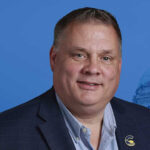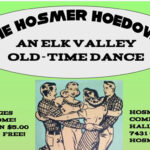Home »

Getting by
By Peter Christensen
Op-Ed Commentary
 “If one stopped to think about it, it was depressing how little most men learned in their lifetimes,” Captain Call. (Lonesome Dove, a novel)
“If one stopped to think about it, it was depressing how little most men learned in their lifetimes,” Captain Call. (Lonesome Dove, a novel)
I quit school, acquired a B Class licence and drove ‘time is money gravel truck’ for a local contractor who owned a backhoe with which he dug holes, built roads, put in culverts and planted septic fields. Verner ran a couple of trucks; one was hired on with the County of Red Deer during summer to haul and spread gravel on the hundreds of miles of clay roads that marked out sections of farmland in Central Alberta.
The trucking season began as soon as the frost heaves settled and it ended in October. About 15 tandem gravel trucks, owned by independent truckers, hauled from County gravel pits five days a week, half a day on Saturday. The first load of the day went out at 6 a.m., the last load went out at 6 p.m. They were long, hot, noisy, dusty days. Driving for Verner, I figured I had reached the pinnacle of success, I was 17.
I quit school, acquired a B Class licence and drove ‘time is money gravel truck’ for a local contractor who owned a back hoe with which he dug holes, built roads, put in culverts and planted septic fields. Verner ran a couple of trucks; one was hired on with the County of Red Deer during summer to haul and spread gravel on the hundreds of miles of clay roads that marked out sections of farm land in Central Alberta.
The next year Verner had his son working with him and did not need a driver. I stayed in touch with the other truckers and let them know I would fill in if anyone needed a driver. Jack, from Edmonton, called me and asked if I would drive. We met Monday morning at the Raven Pit and ran a couple of loads, then I took over. Jack did not show at the end of the week so I kept the truck and resumed driving the next week. Toward the end of the second week Jack reappeared and rode a couple of trips with me, he looked rough and was sucking on a mickey of rye. He showed me a snub-nosed pistol tucked in his belt and paid me cash for the days I had been driving.
Seeing that pistol was a life altering event, a moment of clarification. There was a violent and dysfunctional world only a few steps away! Intuitively I realized that to survive in and understand a rapidly changing ‘greater world’ one would need different goals.
Mahatma Gandhi, one of the early heroes of the humanist revolution pledged that he “would always say in public what he believed in private.” This meant a person should openly pursue their goals. I completed high school and then enrolled in a ‘Liberal Arts’ Program at the University of Lethbridge. I followed a ‘humanist’ path and studied English Literature, Art, Anthropology and Writing poetry.
There I was taught that human nature was created by describing the way we acted, that culture constructs human nature and that biological realities relate only to physical attributes. This worldview inflated the importance of literary intellectuals who were and still are enraptured with the notion that language is the primary source knowledge. Claire Lehmann, the founder of Quillettte Magazine, pointed out in a recent article “culture constructs what we mistake for nature.”
It would take many hard lessons to unlearn ‘Liberal Arts” thinking and understand that imagination had less to do with the actuality of the world than science and measurement; cultural ‘intelligence’ was not rewarded outside the small enclosure of university experience, material reward came as a result of contributing to and working within a market for goods and services.
After graduation from the ‘Liberal Arts’ program I confronted the fact that my university years, though interesting, left me unemployable and in debt for Student Loans. The university experience turned out to be as isolated as the fundamentalist Lutheran cosmology within which I was raised.
Becoming a career poet was wishful thinking. Unlike the immediate desire for change that seeing Jack’s snub-nosed pistol brought it would take a lifetime to reshape and make useful the worldview acquired by attending to liberal arts. Authentic knowledge and practical skills could not be replaced by ideology. It took years to realize that the devaluation of both pathways, the practical and the intellectual, impoverished both. The struggle was to find balance.
The notion of “multiple and hierarchal levels of intelligence” that is popular within the university setting is false. Certain kinds of intelligence are not more valuable than others. The problem with this belief is it creates barriers to the appreciation of skill sets. The sin of the ‘humanities’ is not recognizing the value of practical skills; the sin of applied knowledge is not understanding that the ‘humanities’ teach compassion and self-knowledge.
I had a choice, further my ‘humanist’ studies and disappear into an intellectual quagmire, (which meant more debt) or go back to doing what I knew how to do, drive a truck and running equipment. I chose something in between; a seasonal lifestyle that left time for study and writing. I did not get rich but I did get by, had something to think about.
– Peter Christensen is a Columbia Valley based writer and poet







